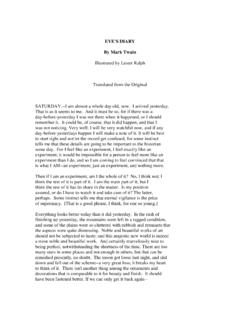Transcription of Quo Vadis, by Henryk Sienkiewicz - …
1 QUO VADISA NARRATIVE OF THE TIME OF NEROby Henryk SienkiewiczTranslated from the Polish by Jeremiah Curtin TO AUGUSTE COMTE, Of San Francisco, Cal., MY DEAR FRIEND AND CLASSMATE, I BEG TO DEDICATE THIS VOLUME. JEREMIAH CURTIN ContentsINTRODUCTORYQUO VADISC hapter IChapter IIChapter IIIC hapter IVChapterXVIIIC hapter XIXC hapter XXChapter XXIC hapter XXIIC hapterXXIIIC hapterXXIVC hapter XXVC hapterXXXVIIC hapterXXXVIIIC hapterXXXIXC hapter XLChapter XLIC hapter LVIC hapter LVIIC hapterLVIIIC hapter LIXC hapter LXChapter LXIC hapter LXIIC hapterLXIIIC hapter VChapter VIChapter VIIC hapter VIIIC hapter IXChapter XChapter XIChapter XIIC hapter XIIIC hapter XIVC hapter XVChapter XVIC hapter XVIIC hapterXXVIC hapterXXVIIC hapterXXVIIIC hapterXXIXC hapter XXXC hapterXXXIC hapterXXXIIC hapterXXXIIIC hapterXXXIVC hapterXXXVC hapterXXVIC hapter XLIIC hapter
2 XLIIIC hapter XLIVC hapter XLVC hapter XLVIC hapter XLVIIC hapterXLVIIIC hapter XLIXC hapter LChapter LIChapter LIIC hapter LIIIC hapter LIVC hapter LVChapterLXIVC hapter LXVC hapterLXVIC hapterLXVIIC hapterLXVIIIC hapterLXIXC hapter LXXC hapterLXXIC hapterLXXIIC hapterLXXIIIEPILOGUEINTRODUCTORYIN the trilogy "With Fire and Sword," "The Deluge," and "Pan Michael," Sienkiewicz hasgiven pictures of a great and decisive epoch in modern history. The results of the strugglebegun under Bogdan Hmelnitski have been felt for more than two centuries, and they aregrowing daily in importance. The Russia which rose out of that struggle has become a powernot only of European but of world-wide significance, and, to all human seeming, she is yet inan early stage of her "Quo Vadis" the author gives us pictures of opening scenes in the conflict of moral ideaswith the Roman Empire, a conflict from which Christianity issued as the leading force Slays are not so well known to Western Europe or to us as they are sure to be in thenear future; hence the trilogy, with all its popularity and merit, is not appreciated yet as it conflict described in "Quo Vadis" is of supreme interest to a vast number of personsreading English.
3 And this book will rouse, I think, more attention at first than anything writtenby Sienkiewicz CURTINILOM, NORTHERN GUATEMALA,June, 1896 QUO VADISQuo Vadis A Narrative of the Time of NeroChapter IPETRONIUS woke only about midday, and as usual greatly wearied. The evening before hehad been at one of Nero's feasts, which was prolonged till late at night. For some time hishealth had been failing. He said himself that he woke up benumbed, as it were, and withoutpower of collecting his thoughts. But the morning bath and careful kneading of the body bytrained slaves hastened gradually the course of his slothful blood, roused him, quickened him,restored his strength, so that he issued from the el othesium, that is, the last division of thebath, as if he had risen from the dead, with eyes gleaming from wit and gladness, rejuvenated,filled with life, exquisite, so unapproachable that Otho himself could not compare with him,and was really that which he had been called, arbiter visited the public baths rarely, only when some rhetor happened there who rousedadmiration and who was spoken of in the city.
4 Or when in the ephebias there were combats ofexceptional interest. Moreover, he had in his own "insula" private baths which Celer, thefamous contemporary of Severus, had extended for him, reconstructed and arranged with suchuncommon taste that Nero himself acknowledged their excellence over those of the Emperor,though the imperial baths were more extensive and finished with incomparably greater that feast, at which he was bored by the jesting of Vatinius with Nero, Lucan, andSeneca, he took part in a diatribe as to whether woman has a soul. Rising late, he used, as washis custom, the baths. Two enormous balneatores laid him on a cypress table covered withsnow-white Egyptian byssus, and with hands dipped in perfumed olive oil began to rub hisshapely body; and he waited with closed eyes till the heat of the laconicum and the heat oftheir hands passed through him and expelled after a certain time he spoke, and opened his eyes; he inquired about the weather, andthen about gems which the jeweller Idomeneus had promised to send him for examination thatday.
5 It appeared that the weather was beautiful, with a light breeze from the Alban hills, andthat the gems had not been brought. Petronius closed his eyes again, and had given commandto bear him to the tepidarium, when from behind the curtain the nomenclator looked in,announcing that young Marcus Vinicius, recently returned from Asia Minor, had come to ordered to admit the guest to the tepidarium, to which he was borne was the son of his oldest sister, who years before had married Marcus Vinicius, a manof consular dignity from the time of Tiberius. The young man was serving then under Corbuloagainst the Parthians, and at the close of the war had returned to the city.
6 Petronius had for hima certain weakness bordering on attachment, for Marcus was beautiful and athletic, a youngman who knew how to preserve a certain aesthetic measure in his profligacy; this, Petroniusprized above everything."A greeting to Petronius," said the young man, entering the tepidarium with a springy step."May all the gods grant thee success, but especially Asklepios and Kypris, for under theirdouble protection nothing evil can meet one.""I greet thee in Rome, and may thy rest be sweet after war," replied Petronius, extending hishand from between the folds of soft karbas stuff in which he was wrapped. "What's to be heardin Armenia; or since thou wert in Asia, didst thou not stumble into Bithynia?
7 "Petronius on a time had been proconsul in Bithynia, and, what is more, he had governedwith energy and justice. This was a marvellous contrast in the character of a man noted foreffeminacy and love of luxury; hence he was fond of mentioning those times, as they were aproof of what he had been, and of what he might have become had it pleased him."I happened to visit Heraklea," answered Vinicius. "Corbulo sent me there with an order toassemble reinforcements.""Ah, Heraklea! I knew at Heraklea a certain maiden from Colchis, for whom I would havegiven all the divorced women of this city, not excluding Popp a. But these are old stories. Tellme now, rather, what is to be heard from the Parthian boundary.
8 It is true that they weary meevery Vologeses of them, and Tiridates and Tigranes, those barbarians who, as youngArulenus insists, walk on all fours at home, and pretend to be human only when in ourpresence. But now people in Rome speak much of them, if only for the reason that it isdangerous to speak of aught else.""The war is going badly, and but for Corbulo might be turned to defeat.""Corbulo! by Bacchus! a real god of war, a genuine Mars, a great leader, at the same timequick-tempered, honest, and dull. I love him, even for this, that Nero is afraid of him.""Corbulo is not a dull man.""Perhaps thou art right, but for that matter it is all one.
9 Dulness, as Pyrrho says, is in no wayworse than wisdom, and differs from it in nothing."Vinicius began to talk of the war; but when Petronius closed his eyes again, the young man,seeing his uncle's tired and somewhat emaciated face, changed the conversation, and inquiredwith a certain interest about his opened his eyes ! No. He did not feel well. He had not gone so far yet, it is true, as young Sissena,who had lost sensation to such a degree that when he was brought to the bath in the morninghe inquired, "Am I sitting?" But he was not well. Vinicius had just committed him to the careof Asklepios and Kypris. But he, Petronius, did not believe in Asklepios. It was not knowneven whose son that Asklepios was, the son of Arsinoe or Koronis; and if the mother wasdoubtful, what was to be said of the father?
10 Who, in that time, could be sure who his ownfather was?Hereupon Petronius began to laugh; then he continued, "Two years ago, it is true, I sent toEpidaurus three dozen live blackbirds and a goblet of gold; but dost thou know why? I said tomyself, 'Whether this helps or not, it will do me no harm.' Though people make offerings to thegods yet, I believe that all think as I do, all, with the exception, perhaps, of mule-drivershired at the Porta Capena by travellers. Besides Asklepios, I have had dealings with sons ofAsklepios. When I was troubled a little last year in the bladder, they performed an incubationfor me. I saw that they were tricksters, but I said to myself: 'What harm!

![Alexandre Dumas [Pere] - drugfreereading.com](/cache/preview/c/c/b/c/a/8/7/a/thumb-ccbca87a7cc7cfeaa952dc924c14315b.jpg)










